 |
||
|
In Leigh Fermor's Footsteps: Athens to Istanbul |
||
|
A Greek-American educated in England sets off to fulfil a vow she madewhile studying. Ioanna Kopsiafti is embraced by strangers as she begins a six-week walk from Athens to the legendary city of Istanbul "No matter how far along the wrong road you have travelled - turn back," says one ancient proverb. With this thought in mind I hoisted my ponderous backpack onto my shoulders, tightened the strap decisively around my waist and looked out from my balcony in Castella to take in the view for the last time before I set out on an epic journey to "The City" - Istanbul, or Constantinople, as it is still known to Greeks. |
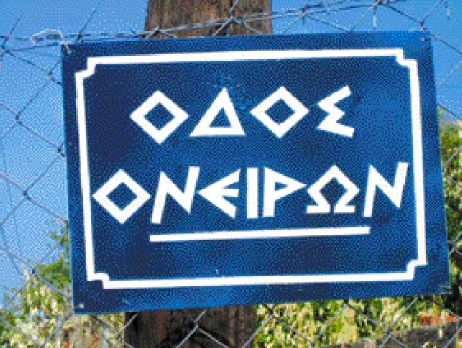 Dream Street: A street sign between Asopia and Kallithea |
|
| The sun was just beginning to rise over Microlimano; the Greek flag fluttered above the yacht club below in the gentle dawn breeze as the masts of the humble caiques lining the shore bobbed up and down. The time had come to fulfil a vow I had made while studying for my DPhil degree at Oxford, inspired by a chance meeting with the philhellene writer Patrick Leigh Fermor. My tama - or vow - was inspired by Fermor's own sojourn to Constantinople back in 1932, of which he wrote in his celebrated book A Time of Gifts. I decided that I too would walk to the fabled city if I were granted my degree. I received my degree in 1999: the journey, from Athens to Istanbul, will cover over 1,900km and last over a month and a half. |
||
| Farewell, Athens The train station in the Port of Piraeus is a place where time stands still. One cannot discern whether it is 1920 or the 70s. An elderly taxi driver named Niko hailed me as I arrived. |
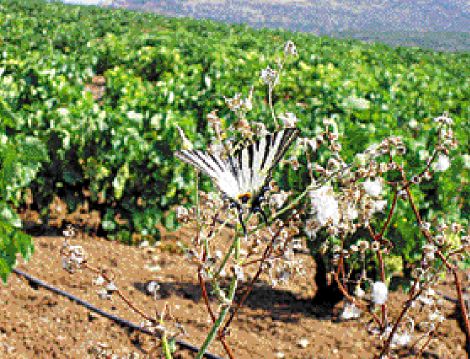 Savatiano vineyards near Asopia. The area's claim to fame is producing Malamatina wine |
|
"On foot, on foot!" I replied. I told him I planned to catch a train to Agios Stephanos, on the outskirts of Athens, where I would begin my walk to avoid the city traffic. He waved his hand in the air. "Po, po," he said in disbelief and called over Kyria Katina, the matron of the station. "Kerase to koritsi," he said, buy the girl a drink. He asked my origins, as most Greeks do upon first meeting me. I told him my father's village was Karyai, Laconia. "Arahova?" he exclaimed, knowing the village's previous name, as well as much of its history. He told Kyria Katina that not only did the Caryatids - the virgin priestesses of Artemis portrayed on the Erechtheion - come from there, but that it also was an antartohori famous for its resistance during World War II. She suppressed a smile and told me of a wise man whom many visited in search of wisdom. Three men came to him to discuss the nature of humankind. One held Man was predominantly bad, another maintained he was good, while the third said he was both good and bad. The wise man agreed with each visitor. When asked by his followers how all three positions could be correct, he told them that each would find their disposition true since they would find what they expected to find, something analogous to Cavafy's meaning. The train pulled up and Kyria Katina and Niko helped me load up my things. I ordered a metrio elliniko cafe and a raki. It was Kyria Katina's turn to ask questions: "Are you not afraid?" I paraphrased a line from Constantine Cavafy's Ithaka, "Laistrygonians, Cyclops, angry Poseidon - you won't find them on your journey if you don't carry them inside you." |
||
| A kafenio in Oinofita
The landscape between Agios Stephanos and Avlona was uninspiring, but Vassili the stationmaster at Avlona was accommodating and gave helpful directions. After an afternoon nap there, I continued towards Oinofita, my next destination. When I arrived there I was exhausted and stopped at the first place I found - an all-male bastion - the kafenio.
It was the usual scene with middle-aged men playing cards, the elderly with their komboloy worry beads and the youth drinking coffee. The cards froze and the dice ceased to rattle as my unexpected appearance caused a sensation. |
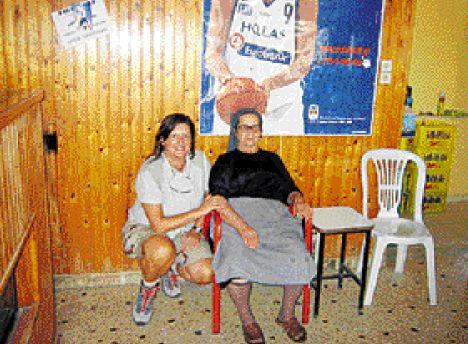 Kyria Yiannoula, one of numerous people who took Ioanna in and fed her during her first week of walking |
|
| I dropped my pack and made straight for the WC to restore myself. After several minutes with my head in the sink under cold running water, I emerged to many inquisitive eyes. The youths had pulled up a chair for me and asked me what I wanted to drink. After my tale was told, the news spread inside the kafenio and soon I had three beers in front of me compliments of various gentlemen. I was surprised to find that several darker youths were Muslims who spoke Turkish, but were Greeks from Komotini. Two of them, Senar and Ahan, had already taken my welfare in hand and recommended I stay the night seaside at Dilesi. As I could not possibly walk another step, they proposed taking me to Dilesi and said they would pick me up in the morning to set out again from this same spot. This did not seem to be transgressing the bounds of my vow and so I went. I set up camp on the beach, as no rooms were to be found. They were concerned about my safety, saying there were many vagrants and foreigners around. I showed them my custom-made Cretan knife, complete with the mandinada I had written myself: On a path I walk, the goal, the city towards which I go And you, Cretan knife, always protect against any potential foe. This did not placate them, but I assured them I was going to be OK. Later they came back to check on me, bringing me some souvlakia and water, for which I was grateful as I was too tired to move once I had set up camp. In the morning I took a refreshing dawn swim and, true to their word, they returned to take me back to Oinofita. After shy embrace they bid me farewell, giving me their phone number in case I needed anything later. |
||
|
|
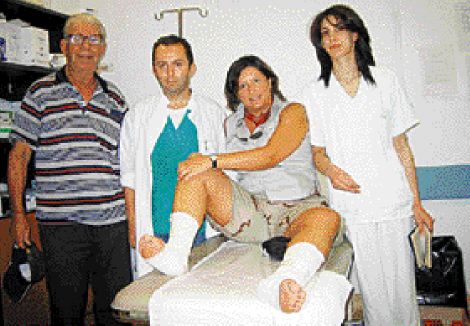 A throbbing ankle in Tanagra |
|
| When I told her of the tama, she pressed my hand sympathetically, remarking that I could have chosen something a little easier. She offered to give me food but I was too hot to eat. I did taste of the koliva served traditionally at memorial services, which is a wheat mixture with pomegranate seeds, toasted almonds, parsley and sugar, which I washed down with a shot of restorative Metaxa. I was vexed to have an injury so early into my journey. |
||
| The owner solicited a gentleman from outside to take my backpack to the next town about 7km down the road, since I refused a ride myself. Although he was reluctant to go without me, the proprietor fended him off, giving me the telephone number of the tavern owner in the next town where I would find my things. I thanked them warmly and set out with a slight limp but feeling much like the statue of Nike of Samothrace, the winged Victory, after having been liberated from my burden. I was already fantasising about buying a donkey to carry my load or arriving in Istanbul with nothing but a toothbrush! I began to notice the beauty that surrounded me - the tapestry of golden fields alternated with endless vineyards that stretched out as far as the eye could see. Without the pack, I walked twice the distance |
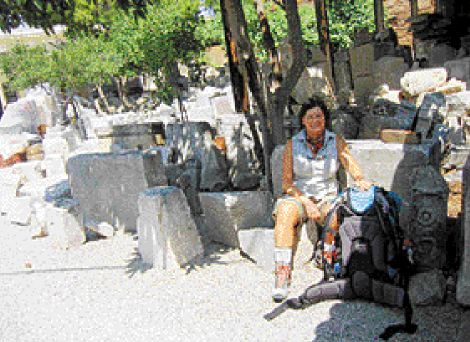 Ioanna sits in the shade of Thiva museum's courtyard. The museum is closed for restoration, but its curator gave the author a personal guided tour of the exhibits |
|
|
in half the time. When I arrived in the next village I was received by Takis, who had all my worldly possessions safely stored awaiting me along with an ice-cold glass of water.
We spoke briefly, I about my sojourn, he about his village called Asopia, which was once known as Hlebotsari from the words hleb, meaning bread in Russian, and tsari, from the word tsar - and meant the "tsar's bread". He promptly gave me the key to his sister's house, telling me I must rest there, take a shower, and that no one would bother me since his sister was away. He was off to a wedding, but advised me that it would be better to stay the night and leave rested in the morning. I was overwhelmed by my good fortune. Inside the cool interior of the old house I felt as if I was in the Savoy. I showered and soon fell into a deep sleep. When I awoke I set out for dinner, asking the first man I encountered in the street where I might find some seasonal vegetables for dinner. He said the only place I would find good cooking was at his house and, before even asking my name, he had ushered me upstairs to meet his wife Magda announcing they had a guest for dinner. The three of us sat down to wild greens, lamb chops and delicious homemade local wine made from Savatiano grapes. I learned more of the area's history and the importance of wine growing in the region, which is home to one of the largest wineries in Greece that operates and makes the well known Malamatina wine. Being with them reminded of the hospitality given to the goddess Athena when, in the opening chapter of the Iliad, she arrives in disguise and is invited in, bathed and fed before her hosts inquire about her origins and identity. The next morning I went to say goodbye to my various hosts. I left some possessions to lighten my load with Kyria Magda, who hugged me and sent me on my way with a host of benedictions. The road from Kallithea to Thiva Ioanna has her feet bandaged by two nurses in Thiva hospital after suffering 'terrible pains' in her ankles after three days of walking. Kyrios Mimis, her host, stands to the left After a brief stop in Kallithea and Neohori, another approximately 10km, I had more sharp pains in my ankle which alternated with blisters on the other foot developed from limping. I found no refuge in the monastery of Agia Paraskevi, which was alleged to have one solitary nun resident. After a brief stop at a hospital outside Thiva, where my ankle was bound and a prescription issued, I prepared myself for the next section of my journey: to Livadeia, Arahova and Delphi and then along the mountain path E4 from Parnassos to Olympus. I thought back on the wisdom of Kyria Katina and decided her words had been a good omen. I had encountered such kindness and hospitality along the way - only three days into my sojourn. In today's media, where one is inundated by images of war and cruelty, people such as Senar, Kyria Yiannoula, Magda and Taki and so many others I have not even mentioned are rays of light that never make the news. But as the art historian Heinrich Wolfflin wrote, "it is indeed the function of light to make diamonds sparkle." Mission statement This walk is undertaken to highlight the belief that individuals have no borders, and that acrimony between the Greeks and Turks is fostered by some people in positions of power who have vested interests in division. Scottish anthropologist Sir Arthur Keith best summarises the spirit of this sojourn: "The course of human history is not determined by what happens in the skies but in the hearts of men". Ioanna's Itinerary July 30: Back to Oinofyta, then on to Tanagra, and Asopia for the night July 31: From Asopia to Kallithea and Thiva (Thebes) for the night August 1: From Thiva to Aliartos for the night August 2: Aliartos to Agia Paraskevi and Livadeia for the night August 3: Livadeia - heading towards Arahova on the E4 path All photos by Ioanna Kopsiafti |
||
(Posting date 21 August 2006) HCS readers can view other excellent articles by the Athens News writers and staff in many sections of our extensive, permanent archives, especially our News & Issues, Travel in Greece, Business, and Food, Recipes & Garden sections at the URL http://www.helleniccomserve.com./contents.html
All articles of Athens News appearing on HCS have been reprinted with permission. |
||
|
||
|
2000 © Hellenic Communication Service, L.L.C. All Rights Reserved. http://www.HellenicComServe.com |
||

